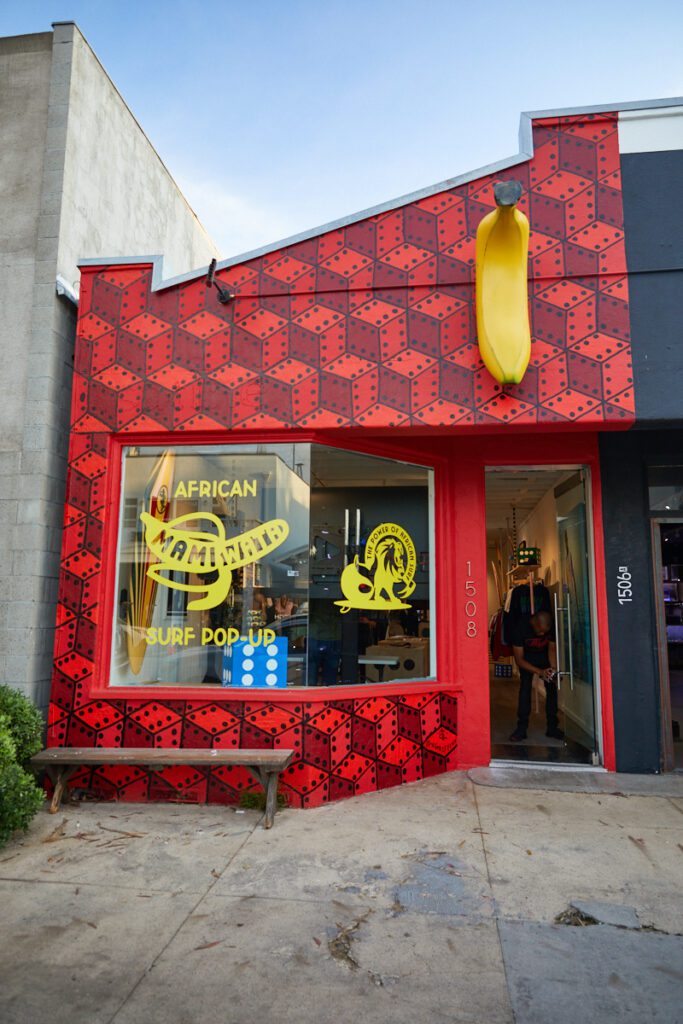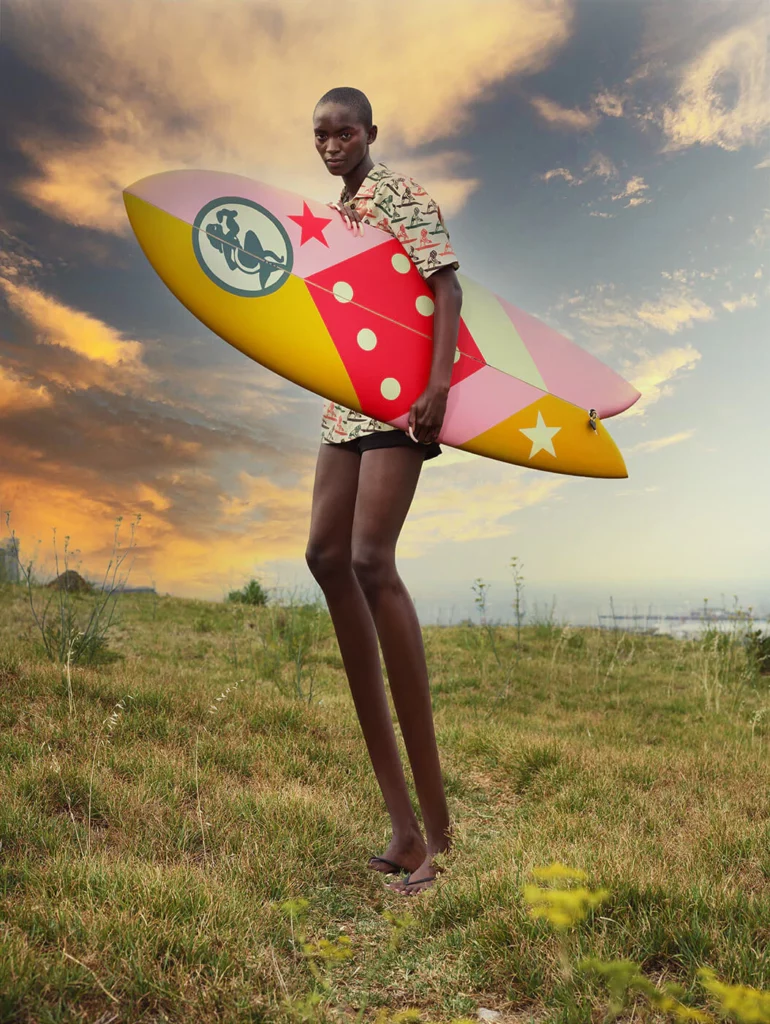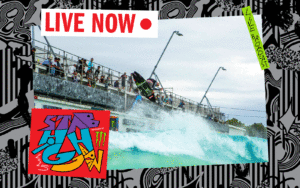A Banana Wrapped In A Hamburger Inside A Trojan Horse
In African art, nothing means nothing.
Question: What do a banana, a giant robot made of dice, and a mermaid have in common?
Answer: The power of African surf.
Still unsure what I’m talking about? Read on.
It was just like any other day in 2016 when South African surfer Nick Dutton stood on the shore of his home break and gazed out into the lineup. There, he noticed something interesting: every surfer in the lineup and on the surrounding sandscape donned boardies and tees made solely by foreign brands – primarily American and Australian ones. Not a local logo in sight.

This may seem unsurprising to most, as, for the better part of the last half-century, a sparse handful of big-name brands have been producing and spreading their goods globally for the enjoyment of surfers and seagoing aspirants alike. But to Nick and his friends, this was alarming. As surfing has grown in recent decades, so too has the industry that feeds off of its constituents. Despite the swell in popularity worldwide, the voices, messages, and ideas coming from within the industry have remained disproportionately monotonal and monochromatic. The result of this has left the surfing world as a whole overwhelmingly represented by a narrow definition of what a surfer looks, walks, talks and lives like – one that is far more exclusive than it is inclusive. Add to this the fact that the terms “surf industry” and “surf culture” have become dangerously commingled, and you have a recipe for widespread alienation of anyone not fitting within the established, razor-thin criteria range.
Enter, Mami Wata.

Literally translated from West African pidgin English, the interest-inducing moniker meaning ‘Mother Water’ refers to an elusive water spirit who, according to centuries-old lore, often manifests in the form of a seductive waterwoman. Yep – a mermaid. Celebrated in Africa’s native and diasporic cultures for generations, legends of this powerful siren illustrate the interconnectedness of the Rainbow Nation’s vast population with its surrounding waters. Recorded observations dating to the 16th century describe indigenous peoples steering their boats into the curl for mere entertainment, the children playing in the waves for hours on end, millennia before the ‘Endless Summer’ was screenwritten.
This benevolent beauty, often seen in artistic depictions with a snake encircling her neck and a mirror in her outstretched hand, is the earth’s aqua embodied, her feminine form representing the primordial bathwaters; the source of all life; a natural playground as well as a sacred space of introspection and the pelagic path that connects disparate bodies of land – and their respective peoples – to each other. With this in mind, it takes little stretch of the imagination to understand why Nick, along with four friends and fellow African surfers, decided after that seemingly-average day six years ago, to form Africa’s first legitimate surf apparel brand in her name.

At first look, Mami Wata Surf’s web and social media profiles reveal a bright, red and white logo of La Sirén herself, presiding above a domain of vibrantly-clad black men and women, dressed in contrasting colors emblazoned with bold iconography: a horse’s profile; countless di, stacked into tetris-esque patterns and shapes like that of a robot; a suggestively angled banana; each inviting a second look, and then a third… What does it all mean?
Nothing means nothing in African art, or, as Senegalese contemporary artist Moussa Tine more articulately expressed, “motifs without meaning are vulgar and useless”. From music to architecture to the exuberantly-painted public transit buses of West Africa known as car rapides – brought to life with vibrant hand-rendered symbols, brilliant lettering and animistic eyes that seem to give life to the aging autos – layered messages lie beneath each and every vivid surface.
Fortunately for the western surfing world – and despite its general ignorance of Africa’s millennia-long relationship with wave riding – Mami Wata (both the merwoman and eponymous apparel brand) comes bearing gifts. A Trojan horse (robot?) of cultural expression, MW is offering a pleasant disruption to the status quo utilizing bold use of color, enigmatic imagery and breathtaking cinematography to tell deep and long overdue tales of the history and culture of surfing in Africa, all in a humble, good-humored and mutualistic manner, no less.
By entering the echo chamber that is the surf industry as we know it, Mami Wata Surf endeavors to change the definition of what that term stipulates from the inside out, effectively floating all boats on a tide of open conversation, empathy and compassion through understanding and genuine interest. The melodic voice of this siren’s song stands apart from the din, and tells with clever allure the story of the power of African surf through a refreshing and richly hued lens.
Check out Mami Wata Surf online or visit their stateside brick & mortar pop-up, open now.
1508 Abbot Kinney Boulevard, Venice, CA













Comments
Comments are a Stab Premium feature. Gotta join to talk shop.
Already a member? Sign In
Want to join? Sign Up